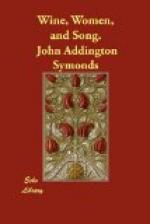Trenchantly true as the inspiration of a popular lyric may be, inevitable as may be the justice of its sentiment, unerring as may be its touch upon reality, still it lacks the note which marks it out for one man’s utterance among a thousand. Composing it, the one has made himself the mouthpiece of the thousand. What the Volkslied gains in universality it loses in individuality of character. Its applicability to human nature at large is obtained at the sacrifice of that interest which belongs to special circumstances. It suits every one who grieves or loves or triumphs. It does not indicate the love, the grief, the triumph of this man and no other. It possesses the pathos and the beauty of countless human lives prolonged through inarticulate generations, finding utterance at last in it. It is deficient in that particular intonation which makes a Shelley’s voice differ from a Leopardi’s, Petrarch’s sonnets for Laura differ from Sidney’s sonnets for Stella. It has always less of perceptible artistic effect, more enduring human quality. Some few of its lines are so well found, so rightly said, that they possess the certainty of natural things—a quality rare in the works of all but the greatest known poets. But these phrases with the accent of truest truth are often embedded in mere generalities and repetitions.
These characteristics of popular poetry help to explain the frequent recurrence of the same ideas, the same expressions, the same stanzas even, in the lyrics of the Goliardi. A Volkslied, once created, becomes common property. It flies abroad like thistledown; settles and sows its seed; is maimed and mutilated; is improved or altered for the worse; is curtailed, expanded, adapted to divers purposes at different times and in very different relations.
We may dismiss the problem of authorship partly as insoluble, partly as of slight importance for a literature which is manifestly popular. With even greater brevity may the problem of nationality be disposed of. Some critics have claimed an Italian, some an English, some a French, and some a German origin for the Carmina Vagorum. The truth is that, just as the Clerici Vagi were themselves of all nations, so were their songs; and the use of a Latin common to all Europe in the Middle Ages renders it difficult even to conjecture the soil from which




